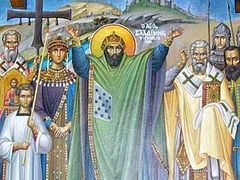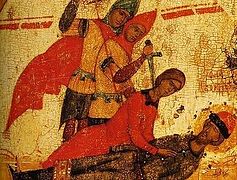 Boris and Gleb. Wall painting in the St. Isaac Cathedral, 19th century. I. K. Dorner.
Boris and Gleb. Wall painting in the St. Isaac Cathedral, 19th century. I. K. Dorner.
On August 6 according to the new Julian Calendar we celebrate the memory of the holy right-believing princes and passion-bearers, Sts. Boris and Gleb.
Many people, even some religious Orthodox Christians, are perplexed as to why the Church numbered Boris and Gleb, the sons of Grand Prince Vladimir, among the saints? What was their Christian podvig? After all, no one tried to make them renounce Christ; the cause of their martyric death was not confession of the faith, but only their special role as princes in public life. In what then consisted their sanctity? Could it really be simply because they placidly allowed themselves to be murdered?
Let us recall their lives and the history of their deaths.
Princes Boris and Gleb (in Baptism, Roman and David) were the youngest sons of Holy Equal-to-the-Apostles Prince Vladimir. The brothers were born not long before the Baptism of Rus’ and were raised in the Christian faith.
When their father, Prince Vladimir, died, his eldest son Sviatapolk, who was in Kiev at the time, proclaimed himself Grand Prince of Kiev. Prince Boris was returning from a campaign at the time. His comrades tried to persuade him to go to Kiev and occupy the throne, but Boris did not wish to start any internecine strife, and let his army go. “I will not raise my hand against my brother, who is even older than I, and whom I should respect as my father!”
Nevertheless, Sviatapolk decided to rid himself of his competitor for the throne and sent an assassin to Boris. The latter knew of the danger in store for him, but did not resist it. On July 24, 1015, after the Sunday service, Boris was killed in his tent on the banks of the Alty River.
After this Sviatapolk just as treacherously killed Prince Gleb also. Craftily calling for his brother to come from his princedom, Murom, Sviatopolk sent his forces to meet him and kill him along the road. Prince Gleb had already learned of his father’s death and the deplorable murder of Prince Boris. Nevertheless, though he grieved deeply, he preferred death rather than war with his brother.
In 1019, Prince Yaroslav the Wise of Kiev, also one of St. Vladimir’s sons, gathered an army and crushed the forces of Sviatopolk. The latter, who is now called by the Russian people, “The Cursed”,1 fled to Poland and, like the fratricide Cain, found no rest or refuge.
After the tragic deaths of Boris and Gleb, as the Chronicles testify, “sedition calmed down in Rus’,” and the internecine wars ceased for a long time there.
What conclusions can we draw from the Lives of Boris and Gleb?
1. The divine grace that Grand Prince Vladimir received at his own baptism and the Baptism of Rus’ completely changed him and gave new birth to the psychology of rulers of those times. After all, in those days (and not only in Rus’), it was practically the norm to commit the most heinous crimes in order to gain power. The behavior of Boris and Gleb, who sacrificed their own lives for the sake of staving off civil war, was utterly atypical even in Christian Europe, never mind the only recently pagan Rus’.
2. Boris and Gleb did not formally suffer for Christ’s name, but they suffered for His word. In Holy Scripture it is written: If a man say, I love God, and hateth his brother, he is a liar (1 Jn. 4:20).
When Sviatopolk willfully occupied the Kievan throne, Boris’s army proposed that they advance on Kiev, but he refused because he didn’t want to spill his brother’s blood and that of other Russian people. Both Boris and Gleb were warned of the impending evil deed, but they humbly accepted death, following the example of the Savior.
Here are Boris’s words: “If he (Sviatopolk) spills my blood and resolves to kill me, I will be a martyr before my Lord. I will not resist, for it is written, “God resisteth the proud, and gives grace to the humble.” Boris, and later Gleb, did not wish to spill their brother’s blood for the sake of gaining earthly glory and might; they both consciously came to the decision to be like Christ, to learn from His meekness and humility, that they might find rest in eternity.
3. Boris and Gleb are also an image of rulers who preferred not to send their people to a fratricidal war, although they knew that death awaited them for their decision.
The holy Passion-Bearers Boris and Gleb are the first canonized saints of the Russian Church. Even in ancient Russia the story of their deaths was compared with the that of the death of righteous Abel at the hands of his brother, Cain. The brothers’ humility and meekness always evoked reverence in all the generations of people who have inhabited the Rus’ lands. Let us also pray to them.



